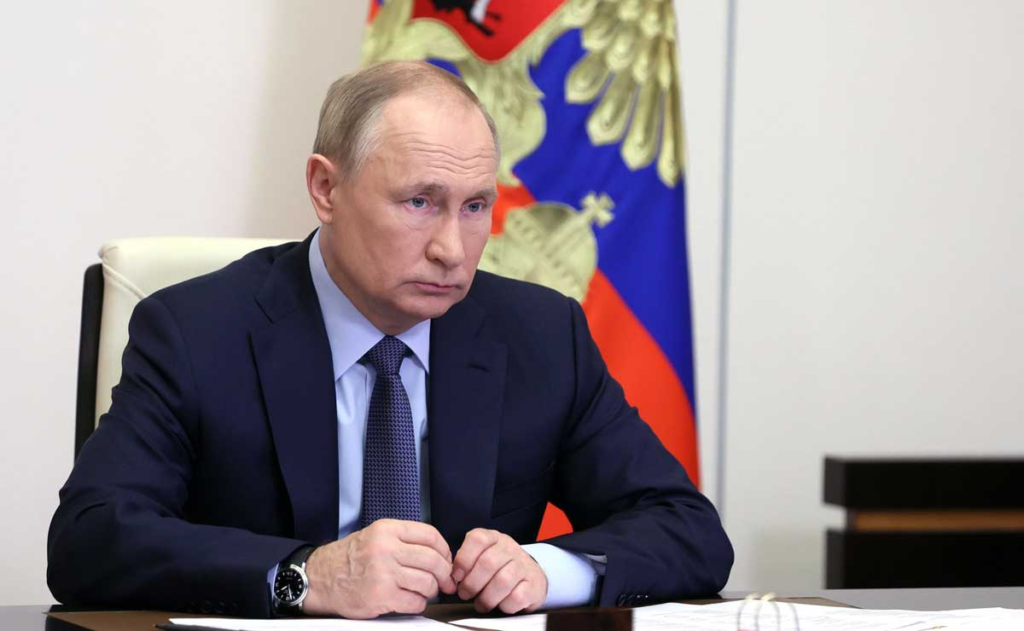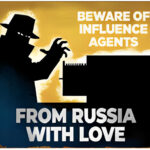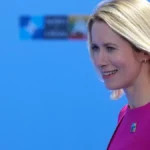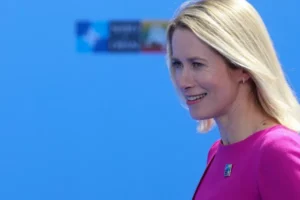President of Russia Vladimir Putin: Thank you very much. President Tokayev, friends and colleagues,
I welcome all participants and guests of the 25th St Petersburg International Economic Forum.
It is taking place at a difficult time for the international community when the economy, markets and the very principles of the global economic system have taken a blow. Many trade, industrial and logistics chains, which were dislocated by the pandemic, have been subjected to new tests. Moreover, such fundamental business notions as business reputation, the inviolability of property and trust in global currencies have been seriously damaged. Regrettably, they have been undermined by our Western partners, who have done this deliberately, for the sake of their ambitions and in order to preserve obsolete geopolitical illusions. …
The flaw is in the concept itself, as the concept says there is one, albeit strong, power with a limited circle of close allies, or, as they say, countries with granted access, and all business practices and international relations, when it is convenient, are interpreted solely in the interests of this power. They essentially work in one direction in a zero-sum game. A world built on a doctrine of this kind is definitely unstable. …
The ruling elite of some Western states seem to be harbouring this kind of illusions. They refuse to notice obvious things, stubbornly clinging to the shadows of the past. For example, they seem to believe that the dominance of the West in global politics and the economy is an unchanging, eternal value. Nothing lasts forever.

Our colleagues are not just denying reality. More than that; they are trying to reverse the course of history. They seem to think in terms of the past century. They are still influenced by their own misconceptions about countries outside the so-called “golden billion”: they consider everything a backwater, or their backyard. They still treat them like colonies, and the people living there, like second-class people, because they consider themselves exceptional. …
Thereby, the irrepressible urge to punish, to economically crush anyone who does not fit with the mainstream, does not want to blindly obey. Moreover, they crudely and shamelessly impose their ethics, their views on culture and ideas about history, sometimes questioning the sovereignty and integrity of states, and threatening their very existence. Suffice it to recall what happened in Yugoslavia, Syria, Libya and Iraq. …
According to experts, the EU’s direct, calculable losses from the sanctions fever could exceed $400 billion this year. This is the price of the decisions that are far removed from reality and contradict common sense.
These outlays fall directly on the shoulders of people and companies in the EU. The inflation rate in some Eurozone countries has exceeded 20 percent. I mentioned inflation in Russia, but the Eurozone countries are not conducting special military operations, yet the inflation rate in some of them has reached 20 percent. Inflation in the United States is also unacceptable, the highest in the past 40 years.
Of course, inflation in Russia is also in the double digits so far. However, we have adjusted social benefits and pensions to inflation, and increased the minimum and subsistence wages, thereby protecting the most vulnerable groups of the population. At the same time, high interest rates have helped people keep their savings in the Russian banking system. …
The growing outlays of European companies and the loss of the Russian market will have lasting negative effects. The obvious result of this will be the loss of global competitiveness and a system-wide decline in the European economies’ pace of growth for years to come.
Taken together, this will aggravate the deep-seated problems of European societies. …
Surging inflation in product and commodity markets had become a fact of life long before the events of this year. The world has been driven into this situation, little by little, by many years of irresponsible macroeconomic policies pursued by the G7 countries, including uncontrolled emission and accumulation of unsecured debt. …
So, they printed more money, and then what? Where did all that money go? It was obviously used to pay for goods and services outside Western countries – this is where the newly-printed money flowed. They literally began to clean out, to wipe out global markets. Naturally, no one thought about the interests of other states, including the poorest ones. They were left with scraps, as they say, and even that at exorbitant prices. …
America’s role has changed drastically. It has turned from a net exporter of food into a net importer. Loosely speaking, it is printing money and pulling commodity flows its way, buying food products all over the world.
The European Union is building up imports even faster. Obviously, such a sharp increase in demand that is not covered by the supply of goods has triggered a wave of shortages and global inflation. This is where this global inflation originates. In the past couple of years, practically everything – raw materials, consumer goods and particularly food products – has become more expensive all over the world.
Yes, of course, these countries, including the United States, continue importing goods, but the balance between exports and imports has been reversed. I believe imports exceed exports by some 17 billion. This is the whole problem.
According to the UN, in February 2022, the food price index was 50 percent higher than in May 2020, while the composite raw materials index has doubled over this period.
Under the cloud of inflation, many developing nations are asking a good question: why exchange goods for dollars and euros that are losing value right before our eyes? The conclusion suggests itself: the economy of mythical entities is inevitably being replaced by the economy of real values and assets. …
As for Europe, their failed energy policy, blindly staking everything on renewables and spot supplies of natural gas, which have caused energy price increases since the third quarter of last year – again, long before the operation in Donbass – have also exacerbated price hikes. We have absolutely nothing to do with this. It was due to their own actions that prices have gone through the roof, and now they are once again looking for somebody to blame.
Not only did the West’s miscalculations affect the net cost of goods and services but they also resulted in decreased fertiliser production, mainly nitrogen fertilisers made from natural gas. Overall, global fertiliser prices have jumped by over 70 percent from mid-2021 through February 2022. …
This situation has been brewing for years, spurred by the short-sighted actions of those who are used to solving their problems at somebody else’s expense and who have relied and still rely on the mechanism of financial emission to outbid and draw trade flows, thus escalating deficits and provoking humanitarian disasters in certain regions of the world. I will add that this is essentially the same predatory colonial policy as in the past, but of course in a new iteration, a more subtle and sophisticated edition. …
Today, I would like to talk about the key principles on which our country, our economy will develop.
The first principle is openness. Genuinely sovereign states are always interested in equal partnership and in contributing to global development. On the contrary, weak and dependent countries are usually looking for enemies, fuelling xenophobia or losing the last remnants of their identity and independence, blindly following in the wake of their suzerain.
Russia will never follow the road of self-isolation and autarky although our so-called Western friends are literally dreaming about this. Moreover, we are expanding cooperation with all those who are interested in it, who want to work with us, and will continue to do so. There are many of them. I will not list them at this point. They make up the overwhelming majority of people on Earth. I will not list all these countries now. It is common knowledge.
I will say nothing new when I remind you that everyone who wants to continue working or is working with Russia is subjected to blatant pressure from the United States and Europe; it goes as far as direct threats. …
Russia will build up economic cooperation with these states and promote joint projects. At the same time, we will certainly continue to cooperate with Western companies that have remained in the Russian market despite the unprecedented arm-twisting – such companies exist, too. …
To reduce and bring to a minimum all sorts of abuse and loopholes to exert pressure on entrepreneurs, we are consistently removing loose regulations from criminal law that are applied to economic crimes.
Last March, a law was signed, under which tax-related criminal cases against entrepreneurs shall only be brought before a court by the tax service – there is no other way. Soon a draft law will be passed on reducing the statute of limitations for tax-related crimes and on rejecting lawsuits to initiate criminal proceedings after tax arrears have been paid off.
Working comprehensively, although prudently, we need to decriminalise a wide range of economic offenses, for instance, those that punish businesses without a licence or accreditation. This is a controversial practice today because our Western partners illegitimately refuse to provide such licenses.
Our own agencies must not single-handedly make our businesses criminally liable for actually doing nothing wrong. …
We need to reconsider the conditions for detaining entrepreneurs and for extending preliminary investigations. It is no secret that these practices have long been used inappropriately.
Businesses have been forced to cease operations or go bankrupt even before the investigation is over. The reputation of the owners and of the brand name suffers as a result, not to mention the direct financial loss, loss of market share and jobs. …
Real, stable success and a sense of dignity and self-respect come only when you link your future and the future of your children with your Fatherland. We have maintained ties with many people for a long time, and I am aware of the sentiments of many of the heads and owners of our companies. You have told me many times that business is much more than just making a profit, and I fully agree. It is about changing life around you, contributing to the development of your home cities, regions and the country as a whole, which is extremely important for self-fulfilment. There is nothing like serving the people and society. This is the meaning of your life and work. …
Our country has huge potential, and there are more than enough tasks that need your contribution. Invest here, in the creation of new enterprises and jobs, in the development of the tourism infrastructure, support schools, universities, healthcare and the social sphere, culture and sport. I know that many of you are doing this. I know this, but I wanted to say it again.
This is how the Bakhrushin, Morozov, Shchukin, Ryabushinsky, Akchurin, Galeyev, Apanayev, Matsiyev, Mamontov, Tretyakov, Arsanov, Dadashev and Gadzhiyev families understood their noble mission. Many Russian, Tatar, Buryat, Chechen, Daghestani, Yakutian, Ossetian, Jewish, Armenian and other merchant and entrepreneurial families did not deprive their heirs of their due share, and at the same time they etched their names in the history of our country.
Incidentally, I would like to note once again that it remains to be seen what is more important for potential heirs: money and property or their forefathers’ good name and service to the country. The latter is something that cannot be squandered or, pardon my language, wasted on drink.
A good name is something that will always belong to your descendants, to future generations. It will always be part of their lives, going from one generation to another, helping them and making them stronger than the money or property they might inherit can make them. …
Let me emphasise that generating positive momentum in terms of household income growth and poverty reduction are the main performance indicators for government agencies and the state in general. We need to achieve tangible results in this sphere already this year, despite all the objective challenges we face. I have already assigned this task to the Government.
Again, we provide targeted support to the most vulnerable groups – pensioners, families with children, and people in difficult life situations.
Pensions are indexed annually at a rate higher than inflation. This year, they have been raised twice, including by another 10 percent on June 1.
The minimum wage was also increased by 10 percent at the same time, and so was the subsistence minimum – a reference figure used to calculate many social benefits and payments – accordingly, these benefits should also grow, increasing the incomes of about 15 million people.
In recent years, we have built a holistic system to support low-income families with children. Women are entitled to state support from the early stages of pregnancy and until the child reaches the age of 17.
People’s living standards and prosperity are the most important demographic factors. …
It is up to the strong sovereign states, those that do not follow a trajectory imposed by others, to set the rules governing the new world order. Only powerful and sovereign states can have their say in this emerging world order. Otherwise, they are doomed to become or remain colonies devoid of any rights. … Russia enters this nascent era as a powerful sovereign nation. We will definitely use the new immense opportunities that are opening up for us in this day and age in order to become even stronger.
The moderator, Simonyan, in closing the presentations, addressed Putin with a question, “Mr President, I would like to show you something that I have brought with me especially. It is juice, and it [the packaging] used to be so nicely coloured. … Because we ran out of paint. The producer of paint for such packaging has left Russia, and the producer of the packaging also announced that they are leaving.” Putin opened his reply by saying, “Whenever any decisions are taken, the key issues must be to singled out. What is key for us? Being independent, sovereign and ensuring future-oriented development both now and for the future generations? Or having packaging today? Unless we have sovereignty, we will soon have to buy everything and will only produce oil, gas, hemp fibre, saddles and sell rough logs abroad.” She then called on “President Tokayev, would you like to add anything?” He stated flat-out, that, in his view, the topic of “Juice packaging has no place here.” There were further questions about the different needs of different nations. Putin noted that: “My colleague said we sometimes have disagreements. But of course, behind closed doors, we always have debates. Even so, we always treat each other with respect and always look for and find compromises, which is extremely important.”
Source: Modern Diplomacy















